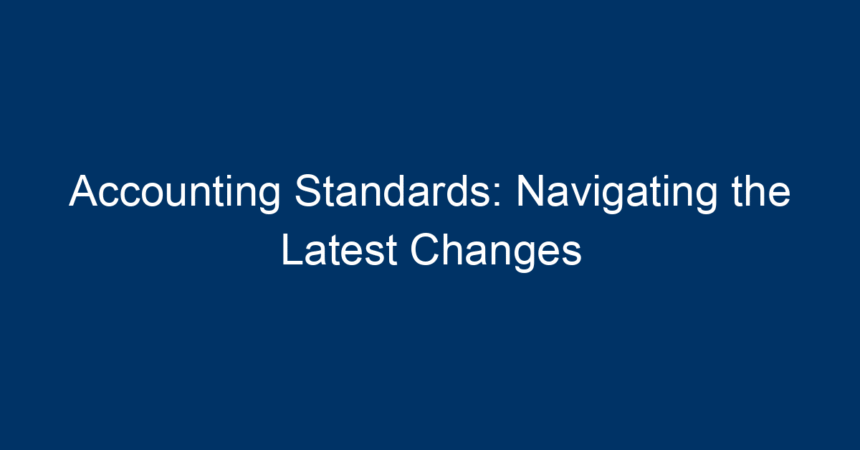In an ever-evolving financial landscape, understanding accounting standards is crucial for businesses and accountants alike. The realm of accounting is governed by specific guidelines designed to ensure consistency, transparency, and accuracy in financial reporting. As these standards continue to evolve, professionals need to stay informed about the latest changes to adapt effectively. In this comprehensive guide, we’ll explore the current landscape of accounting standards, recent updates, and what these mean for businesses going forward.
What Are Accounting Standards?
Accounting standards are authoritative guidelines that dictate how financial transactions should be recorded and reported. These standards ensure that financial statements provide a true and fair view of a company’s financial position and performance. Various bodies, such as the International Financial Reporting Standards (IFRS) and Generally Accepted Accounting Principles (GAAP), establish these standards.
The Importance of Adhering to Accounting Standards
-
Transparency: By complying with established accounting standards, companies enhance transparency. This is vital for shareholders, investors, and stakeholders who rely on accurate financial data for decision-making.
-
Comparability: Consistent reporting enables easier comparison between companies and industries. Whether it’s assessing performance or evaluating investment opportunities, harmonized accounting practices foster great clarity.
- Regulatory Compliance: Many jurisdictions mandate adherence to specific accounting standards. Non-compliance could result in legal penalties, further emphasizing the importance of staying up-to-date with changes.
Recent Changes in Accounting Standards
1. Adoption of IFRS 16: Leases
One of the most significant recent changes in accounting standards is the implementation of IFRS 16, which superseded the previous leasing standard, IAS 17. Effective from January 1, 2019, IFRS 16 introduced a single accounting model for leases. Unlike IAS 17, where leases were categorized as either operating or finance leases, IFRS 16 mandates that lessees recognize almost all leases on their balance sheets.
Key Implications of IFRS 16:
-
Asset Recognition: Lessees must account for a ‘right-of-use’ asset and a lease liability for virtually all leases, presenting a more realistic view of a company’s debts.
- Impact on Financial Ratios: By adding lease liabilities to the balance sheet, financial ratios such as debt-to-equity will be affected, potentially influencing borrowing costs and investor perceptions.
2. Revenue Recognition under IFRS 15
Introduced in January 2018, IFRS 15 revolutionized how companies recognize revenue. This standard shifts the focus from the completion stage of a transaction to the transfer of control of goods and services.
Key Aspects of IFRS 15:
-
Five-Step Model: The recognition process includes five steps – identifying the contract with a customer, identifying performance obligations, determining the transaction price, allocating the price to performance obligations, and recognizing revenue when those obligations are satisfied.
- Impact on Industries: Businesses in sectors like construction, telecom, and software, where revenue recognition was previously contentious, now have a clearer framework to follow, enhancing uniformity in reporting.
3. Changes in Financial Instruments: IFRS 9
Launched in January 2018, IFRS 9 addresses the classification, measurement, and impairment of financial instruments. Unlike its predecessor, IAS 39, IFRS 9 introduces a forward-looking approach to assessing credit losses.
Highlights of IFRS 9:
-
Classification and Measurement: Financial assets are classified based on the entity’s business model and the contractual cash flow characteristics of the asset.
- Expected Credit Loss Model: This shift from an incurred loss model to an expected loss model aims to provide a proactive approach to recognizing and measuring credit losses.
Navigating the Changes: Steps for Businesses
Given the extensive changes in accounting standards, companies must undertake several steps to adapt:
1. Training and Education
It is vital that all accounting personnel undergo training to comprehend the intricacies of new standards. Regular workshops and seminars can ensure that all staff members are aligned and knowledgeable about the accounting standards they must operate within.
2. System Upgrades
Many businesses may need to upgrade their accounting systems or software to support changes brought by new standards. For example, transitioning to IFRS 16 may require new modules that facilitate lease management.
3. Engaging Professionals
Consulting with accounting professionals or external auditors can provide valuable insights into the application of new standards. Their expertise can offer clarity on complex issues and ensure compliance.
4. Internal Audits
Regular internal audits can help identify any gaps in compliance with accounting standards. These audits can also track the implementation of changes and assess the overall financial health of the organization.
The Future of Accounting Standards
As we look towards the future, several trends are influencing the evolution of accounting standards:
1. Increased Focus on Sustainability
More companies are recognizing the importance of sustainability and its impact on financial reporting. Expect more guidelines on environmental, social, and governance (ESG) considerations in accounting practices.
2. Technological Advancements
With the rise of artificial intelligence (AI) and blockchain, the accounting profession will continue to evolve. These technologies promise to streamline processes and enhance accuracy in financial reporting.
3. Standardization Across Borders
Globalization has led to a call for greater harmonization of accounting standards. Efforts to align IFRS and GAAP will continue to grow, allowing companies to report seamlessly across international borders.
Actionable Insights: Staying Ahead
-
Continuous Learning: As accounting standards evolve, commit to ongoing education. Subscribe to industry publications, join professional groups, and attend relevant conferences.
-
Strategic Planning: Prepare a strategic plan for transitioning to new accounting standards. Establish a timeline, set clear milestones, and allocate resources effectively.
-
Engagement with Stakeholders: Keep open lines of communication with stakeholders regarding how changes in accounting standards might impact them. Transparency builds trust and collaboration.
- Review and Adapt: Regularly review your accounting policies and practices. Adaptation is key to staying compliant and meeting the demands of evolving standards.
Conclusion
Navigating the latest changes in accounting standards is not just a regulatory necessity; it’s essential for fostering investor confidence and ensuring the fiscal health of businesses. The landscape is continually shifting, and staying informed about updates such as IFRS 16, IFRS 15, and IFRS 9 will enable companies to thrive in today’s competitive marketplace. By adopting proactive strategies and prioritizing education, businesses can not only comply with current standards but excel in their financial reporting practices. Embrace the changes, and ensure your organization is prepared for the future.




